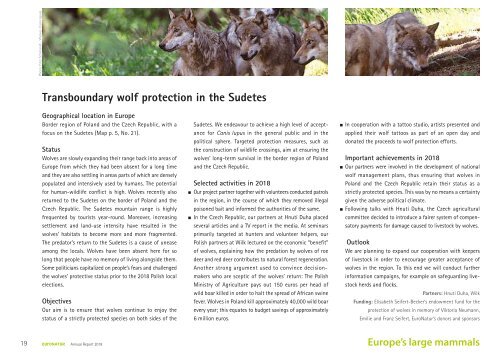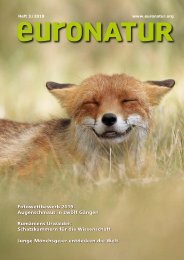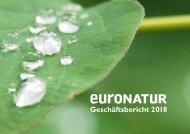Annual Report 2018 EuroNatur Foundation
Here you can get a good overview about our conservation programmes in Europe. Conatains also financial information.
Here you can get a good overview about our conservation programmes in Europe. Conatains also financial information.
Create successful ePaper yourself
Turn your PDF publications into a flip-book with our unique Google optimized e-Paper software.
Photo: Fritz Schimandl - Wolves (Canis lupus)<br />
Transboundary wolf protection in the Sudetes<br />
Geographical location in Europe<br />
Border region of Poland and the Czech Republic, with a<br />
focus on the Sudetes (Map p. 5, No. 21).<br />
Status<br />
Wolves are slowly expanding their range back into areas of<br />
Europe from which they had been absent for a long time<br />
and they are also settling in areas parts of which are densely<br />
populated and intensively used by humans. The potential<br />
for human-wildlife conflict is high. Wolves recently also<br />
returned to the Sudetes on the border of Poland and the<br />
Czech Republic. The Sudetes mountain range is highly<br />
frequented by tourists year-round. Moreover, increasing<br />
settlement and land-use intensity have resulted in the<br />
wolves’ habitats to become more and more fragmented.<br />
The predator’s return to the Sudetes is a cause of unease<br />
among the locals. Wolves have been absent here for so<br />
long that people have no memory of living alongside them.<br />
Some politicians capitalized on people’s fears and challenged<br />
the wolves’ protective status prior to the <strong>2018</strong> Polish local<br />
elections.<br />
Objectives<br />
Our aim is to ensure that wolves continue to enjoy the<br />
status of a strictly protected species on both sides of the<br />
Sudetes. We endeavour to achieve a high level of acceptance<br />
for Canis lupus in the general public and in the<br />
political sphere. Targeted protection measures, such as<br />
the construction of wildlife crossings, aim at ensuring the<br />
wolves’ long-term survival in the border region of Poland<br />
and the Czech Republic.<br />
Selected activities in <strong>2018</strong><br />
Our project partner together with volunteers conducted patrols<br />
in the region, in the course of which they removed illegal<br />
poisoned bait and informed the authorities of the same.<br />
In the Czech Republic, our partners at Hnutí Duha placed<br />
several articles and a TV report in the media. At seminars<br />
primarily targeted at hunters and volunteer helpers, our<br />
Polish partners at Wilk lectured on the economic “benefit”<br />
of wolves, explaining how the predation by wolves of roe<br />
deer and red deer contributes to natural forest regeneration.<br />
Another strong argument used to convince decisionmakers<br />
who are sceptic of the wolves’ return: The Polish<br />
Ministry of Agriculture pays out 150 euros per head of<br />
wild boar killed in order to halt the spread of African swine<br />
fever. Wolves in Poland kill approximately 40,000 wild boar<br />
every year; this equates to budget savings of approximately<br />
6 million euros.<br />
In cooperation with a tattoo studio, artists presented and<br />
applied their wolf tattoos as part of an open day and<br />
donated the proceeds to wolf protection efforts.<br />
Important achievements in <strong>2018</strong><br />
Our partners were involved in the development of national<br />
wolf management plans, thus ensuring that wolves in<br />
Poland and the Czech Republic retain their status as a<br />
strictly protected species. This was by no means a certainty<br />
given the adverse political climate.<br />
Following talks with Hnutí Duha, the Czech agricultural<br />
committee decided to introduce a fairer system of compensatory<br />
payments for damage caused to livestock by wolves.<br />
Outlook<br />
We are planning to expand our cooperation with keepers<br />
of livestock in order to encourage greater acceptance of<br />
wolves in the region. To this end we will conduct further<br />
information campaigns, for example on safeguarding livestock<br />
herds and flocks.<br />
Partners: Hnutí Duha, Wilk<br />
Funding: Elisabeth Seifert-Becker’s endowment fund for the<br />
protection of wolves in memory of Viktoria Neumann,<br />
Emilie and Franz Seifert, <strong>EuroNatur</strong>’s donors and sponsors<br />
19<br />
<strong>Annual</strong> <strong>Report</strong> <strong>2018</strong><br />
Europe’s large mammals





